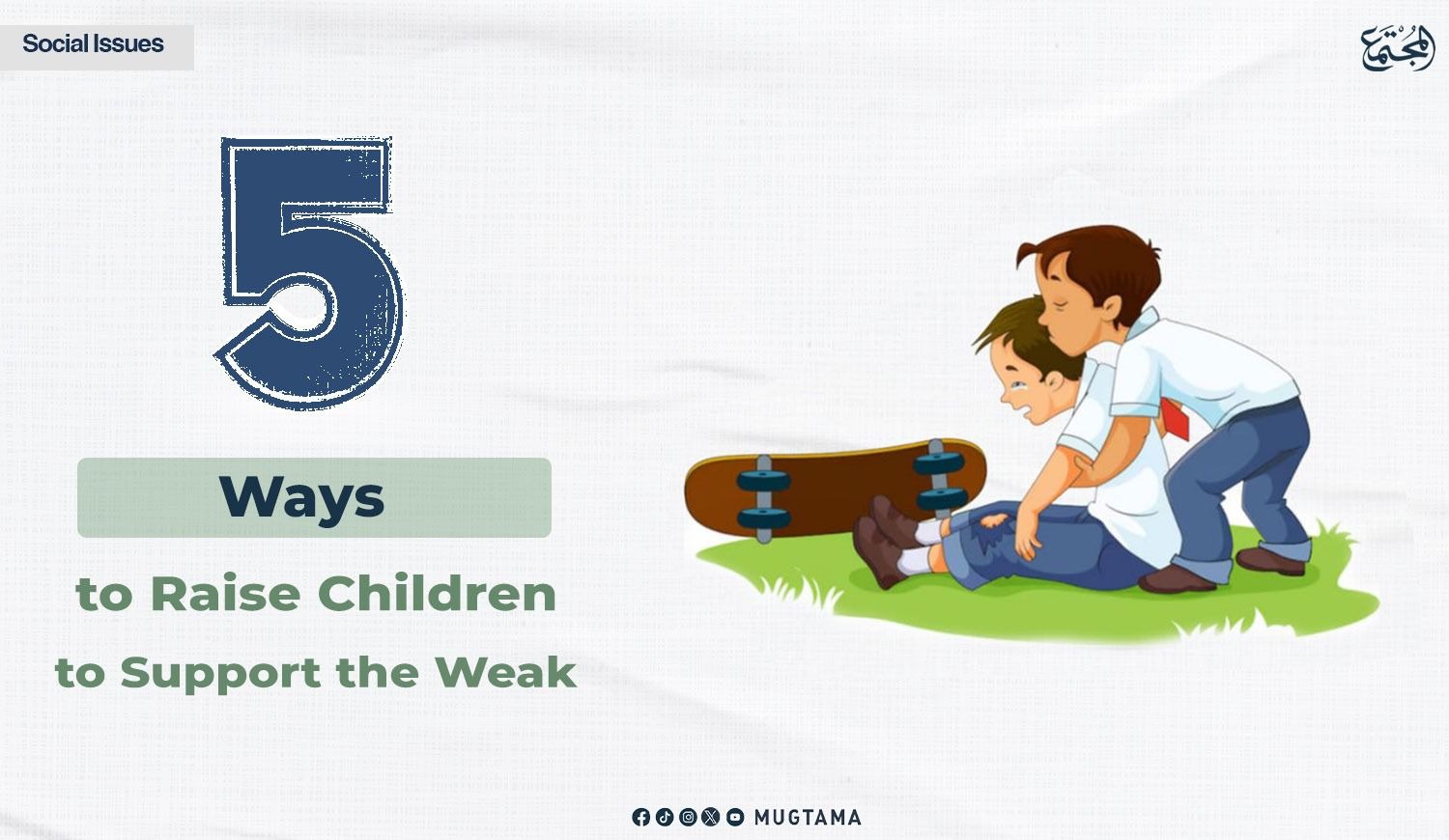5 Ways to Raise Children to Support the Weak

An Educational Incident from the Life
of Abu Bakr (may Allah be pleased with him)
Abu Dawud narrated with an authentic chain
from Abd al-Rahman ibn Abi Bakr, who said: The Messenger of Allah (peace be
upon him) said: “Is there anyone of you who provided food to a poor
man today?” Abu Bakr (may Allah be pleased with him) said: “I entered
the mosque where a beggar was begging; I found a piece of bread in the hand of
‘Abd Ar-Rahman which I took and gave it to him.”
In this incident, there is a lesson in
generosity: the father, Abu Bakr, took a piece of bread from the hand of his
son, ‘Abd Ar-Rahman, to give it in charity to the poor man. Such
an act naturally stirs many questions in the child’s mind, and in this way the
parent instills in the child the value of giving, embedding the principles of
supporting and helping the poor and the weak.
Five Methods for Raising Muslim Children to Support the Weak
Several methods and means contribute to
raising children upon supporting the weak, among them:
1. Establishing the Faith Foundation:
The parent and educator must strive to build a faith-based foundation for
supporting the weak within the hearts of children. This is achieved by
nurturing them upon meanings tied to this principle. Allah Says: {But if they seek your help ˹against
persecution˺ in faith, it is your obligation to help.} [Al-Anfal 8: 72]. And He Says: {And what
is it with you? You do not fight in the cause of Allah and for oppressed men,
women, and children who cry out, “Our Lord! Deliver us from this land of
oppressors! Appoint for us a savior; appoint for us a helper—all by Your
grace.”} [An-Nisa 4: 75].
The foundation can also be established
through the story of Musa (peace be upon him) with the man who sought his help,
and Musa defended him. Allah Says: {˹One day˺ he
entered the city unnoticed by its people.1 There he found two
men fighting: one of his own people, and the other of his enemies. The man from
his people called to him for help against his foe. So Moses punched him,
causing his death. Moses cried, “This is from Satan’s handiwork. He is certainly
a sworn, misleading enemy.”} [Al-Qasas: 15].
Similarly, in the story of Musa (peace be
upon him) with the daughters of the righteous man, Allah Says: {When he arrived at the well of Midian, he found a group
of people watering ˹their herds˺. Apart
from them, he noticed two women holding back ˹their
herd˺. He asked ˹them˺, “What is the matter?” They replied, “We cannot water ˹our
animals˺ until the ˹other˺
shepherds are done, for our father is a very old man.” So he watered ˹their
herd˺ for them, then withdrew to the shade
and prayed, “My Lord!
I am truly in ˹desperate˺ need of
whatever provision You may have in store for me.”} [Al-Qasas: 23–24].
The Sunnah also emphasizes this principle.
In Sahih al-Bukhari, Anas reported that the Messenger of Allah (peace be
upon him) said: “Help your brother, whether he is an oppressor or
is oppressed.” A man said, “O Messenger of Allah! I help him when
he is oppressed, but how can I help him when he is an oppressor?” He said: “You can keep
him from committing oppression. That will be your help to him.”
2. Reviving Human Emotions:
Children need tools that help awaken the human emotions Allah instilled in
people, such as sadness, grief, and anger when witnessing oppression and
injustice. These emotions lay the foundation for rejecting injustice and
inspire children to take action in supporting the oppressed and alleviating
their suffering.
Practical ways to achieve this include
watching real events of oppression and hardship occurring in Muslim lands, as
well as visiting orphanages and relief centers.
3. Practical Role Models:
Practical role models play a significant role in instilling the value of
supporting the weak. This can be done by recounting the stories of the
righteous mentioned in the Qur’an and the lives of the Messengers, especially
the example of the Prophet Muhammad (peace be upon him).
It also occurs through living role
models—the actions of parents or educators who support the oppressed and stand
by them with whatever means they can. This begins with small, everyday acts
within the family, the street, or the school, and extends to supporting the
oppressed across the world.
4. Developing Moral Sensitivity:
Children must be trained to reject all forms of oppression. This is achieved by
making them aware of injustice whenever it occurs—whether at home, school, or
in the street—and encouraging them not to remain silent when someone is
wronged, but instead to stand with the oppressed and call others to stand with
him until his rights are restored.
An essential part of this is the parent or
educator practicing fairness in small matters before large ones, such as
treating children or students equally in all aspects of life.
5. Solidarity Activities:
Various activities can cultivate the spirit of solidarity and cooperation while
training children to support the weak. Parents and educators can assign roles
and tasks that encourage helping others, whether at home or school—for example,
asking the older child to care for his younger sibling, or a high-achieving
student to help one struggling. Such tasks instill responsibility and
solidarity.
This can then be expanded to include
participation in charitable and voluntary work, relief campaigns, and
encouraging children to give from their own money—or from their time and
effort—such as carrying items for an elderly person, guiding someone who is
lost, or accompanying a weaker classmate.
-------------------------------------------------------------
Read Also:
-
Daily
Muslim Life: Faith, Giving, and Compassion
-
The Role
of Zakat in Achieving Financial Sufficiency










